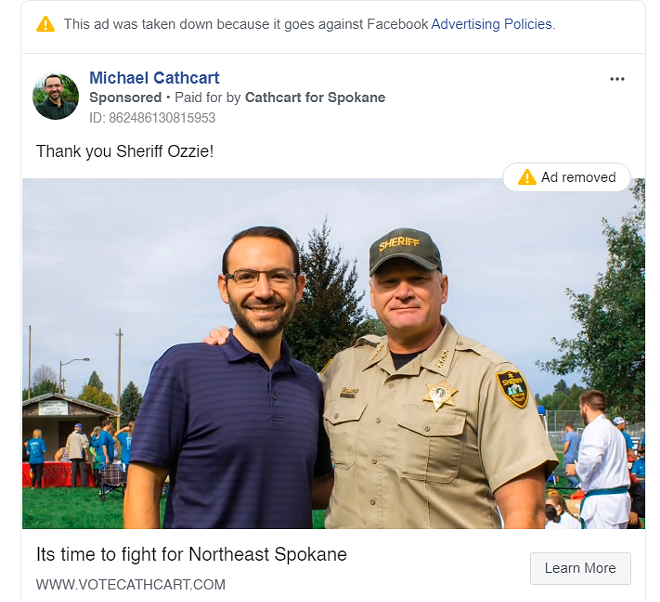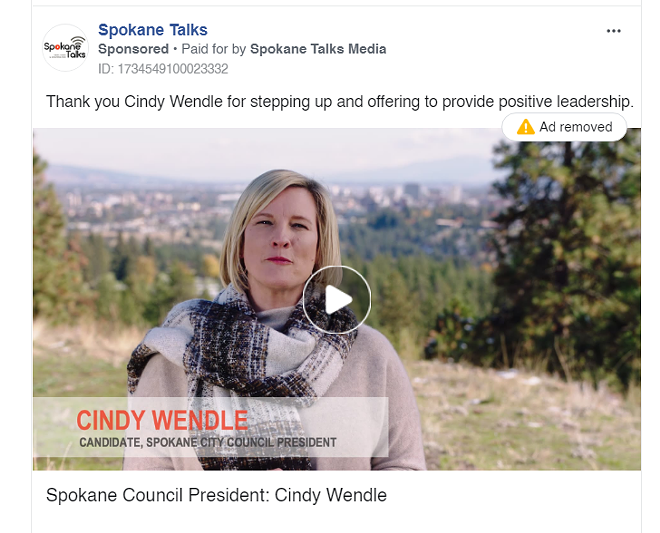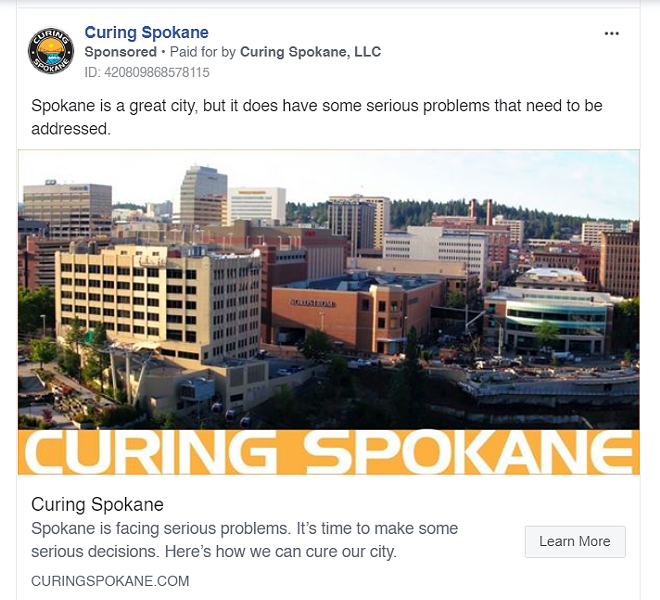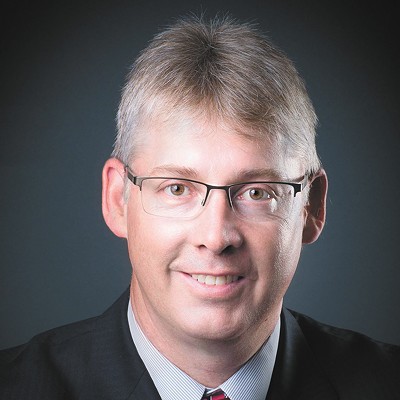
They made a promise and everything.
Accused of failing to adhere to Washington state's transparency regulations by Attorney General Bob Ferguson, Facebook agreed to stop selling political ads in Washington state by December 31, 2018.
Today, Facebook's ad policy explicitly says that "ads must not run in or be targeted at the state of Washington when the ads relate to Washington's state or local elected officials, candidates, elections or ballot initiatives."
But, as the Stranger has repeatedly reported, that hasn't stopped a lot of Washington state politicians and political groups from continuing to buy ads on Facebook. And Spokane is no exception.
Facebook's Ad Library tool allows anyone to search for ads about "social issues, elections or politics.'' And it's not hard to find a ton from Spokane.
Mayoral candidate Nadine Woodward spent less than $100 to put out these Facebook ads at the end of July.
In just the last week, City Council candidate Michael Cathcart has spent $289 dollars on Facebook ads.
"If Facebook doesn’t shut them down, that’s on Facebook," Cathcart says. He notes that his opponent, Tim Benn, has run plenty of Facebook advertisements, too.
After all, it's only a violation of Facebook's rules — not Washington state campaign finance law.
"I mean, Facebook is nothing more than a vendor," Cathcart says. If they choose to accept some ads and not accept others, that's their right, he argues.
He's had some ads taken down, but others have been left up.
"I hope all this gets clarified," Cathcart says. "It’s confusing for everyone."
One ad Cathcart ran in September bragging about his support from Spokane Sheriff Ozzie Knezovich ran for two days without in problem. But a Facebook ad in October featuring Knezovich's video endorsement was removed.
"I think it’s mostly if somebody sees it and they file an anonymous complaint about it," Cathcart says. "There was an individual on the other side of the political fence who had told me that if he sees any sponsored political post, he’ll file a little anonymous complaint about it to level the playing field."
Most of the Spokane political candidates, including mayoral candidate Ben Stuckart, and City Council candidates Lori Kinnear, Karen Stratton and Andy Rathbun did not directly run any Facebook ads. Stuckart says he tried to run Facebook ads, but was unsuccessful.
“They rejected me," Stuckart says. "I saw other candidates out there doing it. I tried to put them up because Facebook does better targeting than other sites… They did not take ours, even though they’ve taken other candidates locally.”
But Spokane school board candidate Kevin Morrison ran several Facebook ads this summer. And multiple groups on both sides of the political spectrum have run Facebook ads.
The conservative Citizens' Alliance for Property Rights ran Facebook ads for Benn and City Council candidate Tony Kiepe. Occupy Spokane ran an ad this month imploring supporters to "For the love of everything good- please vote for Ben Stuckart and Breean Beggs... We can’t let heartless Cindy and Nadine get into office. They will be detrimental to our houseless friends."
City Council presidential candidate Cindy Wendle's campaign did not directly run any Facebook ads, but a local talk radio show, Spokane Talks, paid to run one of Wendle's ads on Facebook. Facebook later removed the ad.
The Inlander called Spokane Talks' Kent Adams to try to understand why a news interview program was running paid Facebook ads for a City Council candidate, but Adams declined to answer over the phone, instead politely issuing the Inlander an invitation.
“My approach with the media is if you want to come ask me questions you ask me on our show, live,” Adams says.
Liberal activist group Fuse Washington recently spent a little less than $100 on Facebook to recruit canvassers against Tim Eyman's I-976 initiative.
Collin Jergens, spokesperson for the Fuse says that Facebook does seem to ban certain political ads, but it's inconsistent.
"During the legislative session we were unable to run any Facebook ads that mentioned the name of legislators," Jergens says.
Like Cathcart, Jergens places most of the responsibility for consistently enforcing its advertising policy on Facebook.
"I would love for Facebook to increase their transparency and fully comply with Washington state laws. It’s inconceivable that a company of Facebook's size can’t comply with our state laws," Jergens says. "There’s literally a checkbox that says, 'This ad relates to politics, elections and social issues.' We check that box for all of these ads. Facebook knows that we're in Washington state, but they let us run the ads."
Jergens notes how tiny Fuse's Facebook ad spending has been when compared to the tidal wave of ad spending by tech behemoth Amazon for the Seattle elections.
While Facebook allows political advertisements in other states, it's come under increasingly intense amounts of fire for its policy allowing politicians to make false claims in those advertisements. Presidential candidate Elizabeth Warren recently protested this policy by running her own Facebook advertisements making false claims about Facebook.
Today, Twitter announced they'd be taking a different tack, by refusing to sell any political advertising — other than voter registration efforts — on their site at all:
But critics quickly pointed out that any sort of censorship strategy can be hard to enforce. What happens if the Spokesman-Review wants to promote its political coverage? Does that count as an ad? What if the Spokesman-Review wants to promote the endorsements chosen by their publisher? Does that count as an ad? Now what if Michael Cathcart wants to promote his Spokesman-Review endorsement? Does that count?For instance, it‘s not credible for us to say: “We’re working hard to stop people from gaming our systems to spread misleading info, buuut if someone pays us to target and force people to see their political ad…well...they can say whatever they want! 😉”
— jack 🌍🌏🌎 (@jack) October 30, 2019
For that matter, what about issue-based videos like "Curing Spokane?"
Local businessman Larry Stone's spent nearly $1,000 on Facebook ads promoting his controversial "Curing Spokane" video that calls more jail space and more aggressive law enforcement as a solution to property crime and drug use downtown. Meanwhile, a blogpost rebuttal to "Curing Spokane," written by former Downtown Spokane Partnership president Mike Tedesco, was promoted with Facebook ads by — according to Facebook — "a total stud muffin."
Of course, the pittance spent locally on Facebook ads pales in comparison to the influence of the heaps of cash dollars spent on mailers, paid doorbellers, print ads and TV ads funded by groups like the local firefighters union, wealthy real estate scion Fritz Wolff, and the Washington Association of Realtors.
Heck, the Washington Realtors ran an ad on Facebook from Aug. 29 to Sept. 12 citing a Spokesman-Review article that discussed their political influence:
But for all the money being spent, Cathcart argues the most effective persuasion technique in Spokane remains the old-fashioned one.
"Door to door is the most effective thing you can do," Cathcart says. "If it’s you as the candidate, knockin' on the door, saying hello, answering questions if they have questions, that’s the most effective way to campaign."






























